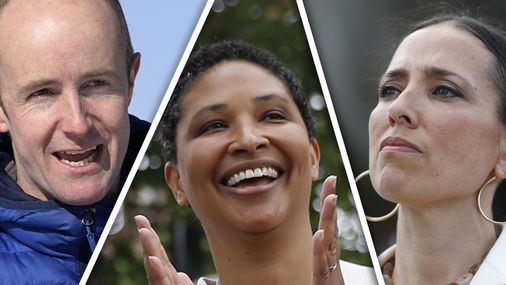Massachusetts voters wont be heading to the polls to elect a governor anytime soon, but a few Democratic campaigns are already underway: Former state senator Ben Downing jumped in the race back in February, and Harvard professor Danielle Allen and state senator Sonia Chang-Díaz announced their bids in June.
Though the general election is not for another 15 months, Democrats need all the time they can get to push their messages out. Thats because if Governor Charlie Baker chooses to run again, they will have an uphill battle against a popular incumbent whose poll numbers have remained relatively stable, and in some cases improved, throughout the pandemic. The sooner Democrats are out campaigning, the more opportunity there is for Massachusetts residents to reconsider their last pick for governor, even if that pick happens to be one of the most popular governors in the country.
Since at least some Democratic candidates have this time between now and Election Day 2022, they have to figure out how best to use it. So far, the three major candidates have pitched a message of fundamental and transformative change. But what good is a campaign for change if voters at least a solid majority of them are satisfied with how things are going? It depends on whether Democrats can actually show voters that conditions in Massachusetts are not as rosy as public polling suggests.
When it comes to poverty and inequality in the state, the picture paints itself: Among the 50 states, Massachusetts has seen the sharpest rise in family homelessness since 2007. It also has one of the highest rates of income inequality in the country, declining economic mobility, and a criminal justice system that not only disproportionately locks up Black and Latino residents but also hands them longer sentences, on average, than their white peers. (And that was all before the pandemic.)
Elections are an opportunity for leaders to respond to their constituents most urgent needs. And in Massachusetts, the need to address poverty and racial and economic inequality is clear, and thats exactly what Democrats ought to center their campaigns on.
For his part, Downing is on track to do just that. His campaign has already released an anti-poverty plan filled with policy solutions such as partially matching the federal Child Tax Credit, strengthening rental vouchers, and targeting jobs programs to struggling communities with high rates of poverty. When we look at Massachusetts on the aggregate, it tells one story, and a story that is generally of relative health and relative prosperity, Downing said in an interview. But I think the real story of Massachusetts is the gaps from one community to the next, and even gaps within communities.
Allen echoed that sentiment. We do have very significant disparities in Massachusetts, she said in an interview, referencing income, health, education, and justice. All of these are areas where if you look at things like the median number, Massachusetts looks like its performing pretty well. But if you actually look at the spread of experience and the disparities, its extraordinary and embarrassing for the state, frankly, as well as just plain unjust and unfair for people who are on the short end of the stick.
Allens campaign is still in the process of coming up with remedies for those disparities. I dont believe, actually, in just dropping a plan on people, Allen said. I think you need stakeholder engagement first. But while Allen has yet to release an anti-poverty plan of her own, one promising sign is that she said her campaign intends to start with a housing agenda from strengthening tenants rights to creating more affordable housing which will be the first of what she called five building blocks of social infrastructure: housing, transportation, schools, good jobs, and justice. Thats a good start, and theres plenty of time to build on it.
Chang-Díaz mentioned similar themes. We need to make systemic investments in education, housing, safe, reliable transit, and green energy, and new, good-paying jobs in our poorest communities, she said in an e-mail statement, but her campaign has yet to detail how she plans to approach these issues.
The key for Democrats is to not lose sight of the actual needs of everyone in the state, because with a coherent anti-poverty agenda, one success of these campaigns, even if they end up losing the election, is that they will have elevated the voices of the most marginalized. And that, in the end, is a campaign worth fighting for.
Abdallah Fayyad can be reached at abdallah.fayyad@globe.com. Follow him on Twitter @abdallah_fayyad.read more
In governor’s race, Democrats need an anti-poverty agenda


